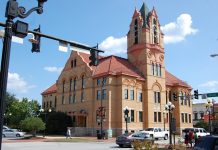By Stan Welch
In December, the Anderson County Transportation Committee (ACTC) contracted with CoTransco, a consulting and program management firm. Monday, the committee invited the mayors and public works directors from the county’s various municipalities to meet officers of the company; and to hear some fresh ideas about funding and other issues related to roads and paving.
Terry Bragg and Jeff Hildebrandt were on hand, with Bragg doing most of the talking. Committee Chairman Ronnie Townsend began the presentation by explaining the committee’s decision to hire CoTransco.
He stated that there will be several results of the decision. “First, this will shift the cost and burden of engineering requirements for the towns who propose projects to the committee. Instead of having to use or hire your own engineers, at your own expense, you simply propose a project to the Committee. We will pass that request on to Terry and his folks. They’ll take it from there.”
Townsend explained that the new system will also ensure a consistent standard of engineering. “The same firm will engineer each job, no matter where it is, so the committee will always know we’re talking about oranges and oranges. We also feel like Terry and his staff will bring projects to the contract letting stage much quicker, because they are all DHEC and state certified, so we don’t have to send every single project to Columbia for approval.”
Townsend’s last point was that the new approach will remove any political pressure that might be brought to bear on the Committee and the county staff to push certain projects, in contrast to the priorities established.
Bragg then expounded on a funding approach that he says his firm and the Greenville County transportation committee have used for the last several years. Known as the Municipal Matching Resurfacing Program (MMRP). This program would encourage municipalities to begin building paving funds into their annual budgets, something none of Anderson County’s towns currently do.
The incentive lies in the Committee’s willingness to match those funds dollar for dollar, doubling the amount of paving which a town could accomplish on any given project. Townsend made it clear that the Committee understands that such a budget approach will take time, and that the projects presented to the committee in the meantime will be considered and funded in the ways that they always have.”
“We are not trying to coerce or punish anyone. That is absolutely not the purpose of this program, which we are considering. We want input from the mayors and the people who have to prioritize these projects. No one knows your roads and needs better than you do. But if you can build some funding into your budgets in the next couple of years or so, where else can you get a one hundred per cent return on that money?”
Everyone present acknowledged the decreasing accessibility of funding for roads, and Bragg pointed out that current reports of a possible increase in the state gasoline tax, which provides the C funds administered by the ACTC, will have little if any effect on those funds. “That money is very unlikely to make it to the county level. The state’s roads are bad enough that any additional funds will be spent on that system of roads.”
West Pelzer Mayor Peggy Paxton bemoaned the fact that the town’s hospitality tax can only be used for recreation and tourism purposes. “We have spent a lot of money in the last few years on water and sewer lines. It’s hard to see where we can come up with enough to put money for paving in our budget right now.”
Williamston Mayor Mack Durham supported the idea, but expressed a concern that the bigger municipalities might get a bigger cut, adding that perhaps a system weighted to balance the scales with the smaller towns might be something to consider.
Again, Townsend made it clear that no quick action is anticipated. “We just wanted to get this before you to be thinking about. Most of you will begin your budget process in the next few weeks, so we wanted to make this possibility known to you. Everyone in this room is here because we all serve the people of Anderson County in one way or the other. This is just a possible means to increase that service.”














